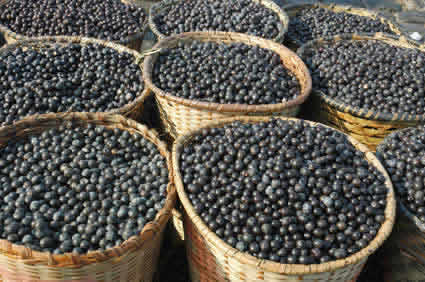Acai (Euterpe oleracea) is a fruit that grows on the acai palm trees in the Amazon rain forest of Brazil. Researches have shown that this super fruit is one of the most nutritious and antioxidant rich foods in the world. Acai berry is loaded with antioxidants, phytonutrients, essential fatty acids, omega 3, 6 and 9, amino acids, vitamins, minerals, glutamic acid, oleic acid, palmitic acid, linoleic acid, beta-sitosterol procyanidin oligmers, vanillic acid, syringic acid, p-hydroxybenzoic acid, protocatechuic acid, ferulic acid, complex carbohydrates and dietary fibre. In vitro and in vivo studies have shown that acai has antioxidant, anti-inflammatory, apoptotic and atheroprotective activities.
Acai Juice Health Effects and Benefits
The pulp and skin of the acai fruit are rich in compounds known as anthocyanins and proanthocyanidins. In both in vitro and animal-based studies, acai has showed antioxidant and anti-inflammatory properties. This fruit has also been shown to induce apoptosis in HL-60 leukemia cells through caspase-3 activation. Several foods have been tested for ORAC (Oxygen Radical Absorbance Capacity) value, however, freeze-dried acai powder has the highest ORAC activity of any fruit or vegetable. (In 1992, the ORAC test was developed by Dr. Guohua Cao, a doctor at the National Institute on Aging in Baltimore, Maryland). Researches at the Jean Mayer USDA Human Nutrition Research Center on Aging at Tufts University in Boston indicate that consuming vegetables and fruits with a high-ORAC value may help slow the aging process in both body and brain.”
 Acai berry contains compounds called anthocyanins and flavonoids. Flavonoids and anthocyanins are strong antioxidants that help defend the body against life’s stressors. Antioxidants protect against free radicals, highly reactive atoms and molecules that can damage DNA and other important molecules in the cell. Free radicals are the result of some oxygen molecules that are converted into oxidizing substances during the process that creates energy in cells, cellular respiration. Oxygen is a very active element, and in the stage of exchanging the molecules in the bloodstream, oxygen combines with many different compounds. Some of these compounds can cause damage to body tissue. Oxidative stress has been implicated in the development of a number of conditions including arthritic disorders, cancer, and cardiovascular problems. Anthocyanins may help prevent cardiovascular disorders, inflammatory responses, cancer, and degenerative diseases. Anthocyanins also improve neuronal and cognitive brain functions, ocular health as well as protect genomic DNA integrity. In recent years, numerous publications have demonstrated that besides their in vitro antioxidant capacity, certain phenolic compounds, such as anthocyanins, proanthocyanidins, and other flavonoids, may regulate different signaling pathways involved in cell survival, growth and differentiation.
Acai berry contains compounds called anthocyanins and flavonoids. Flavonoids and anthocyanins are strong antioxidants that help defend the body against life’s stressors. Antioxidants protect against free radicals, highly reactive atoms and molecules that can damage DNA and other important molecules in the cell. Free radicals are the result of some oxygen molecules that are converted into oxidizing substances during the process that creates energy in cells, cellular respiration. Oxygen is a very active element, and in the stage of exchanging the molecules in the bloodstream, oxygen combines with many different compounds. Some of these compounds can cause damage to body tissue. Oxidative stress has been implicated in the development of a number of conditions including arthritic disorders, cancer, and cardiovascular problems. Anthocyanins may help prevent cardiovascular disorders, inflammatory responses, cancer, and degenerative diseases. Anthocyanins also improve neuronal and cognitive brain functions, ocular health as well as protect genomic DNA integrity. In recent years, numerous publications have demonstrated that besides their in vitro antioxidant capacity, certain phenolic compounds, such as anthocyanins, proanthocyanidins, and other flavonoids, may regulate different signaling pathways involved in cell survival, growth and differentiation.
Acai fruit shows strong anti-inflammatory effects, according to a study reported in the April 2011 edition of the Journal of Agricultural and Food Chemistry. An ethanol extract of acai fruit peel inhibited testosterone 5-alpha reductase. In people with an enlarged prostate, dysuria was prevented by the use of 2 tablets per day (80 mg of fruit peel extract powder per tablet) for 1 month. Acai berry antioxidants inhibit inflammation and avoid oxidative damage to the cardiovascular system, according to a study reported in the Feb 2011 edition of the journal Atherosclerosis. Scientists at the “University of Florida” have found that extracts taken from Acai berries “helped to kill leukaemia cells” under lab conditions. The University of Florida have been testing this fruit in a variety of concentrations and have found that dependent on the extract concentration, the acai berries has created aptosis in blood cells from anywhere between 35 – 86%. Apoptosis is an prominent protective mechanism which ensures that cells with DNA mutations are effectively destroyed, as left unchecked, these cells may become cancerous.
Leave a Reply